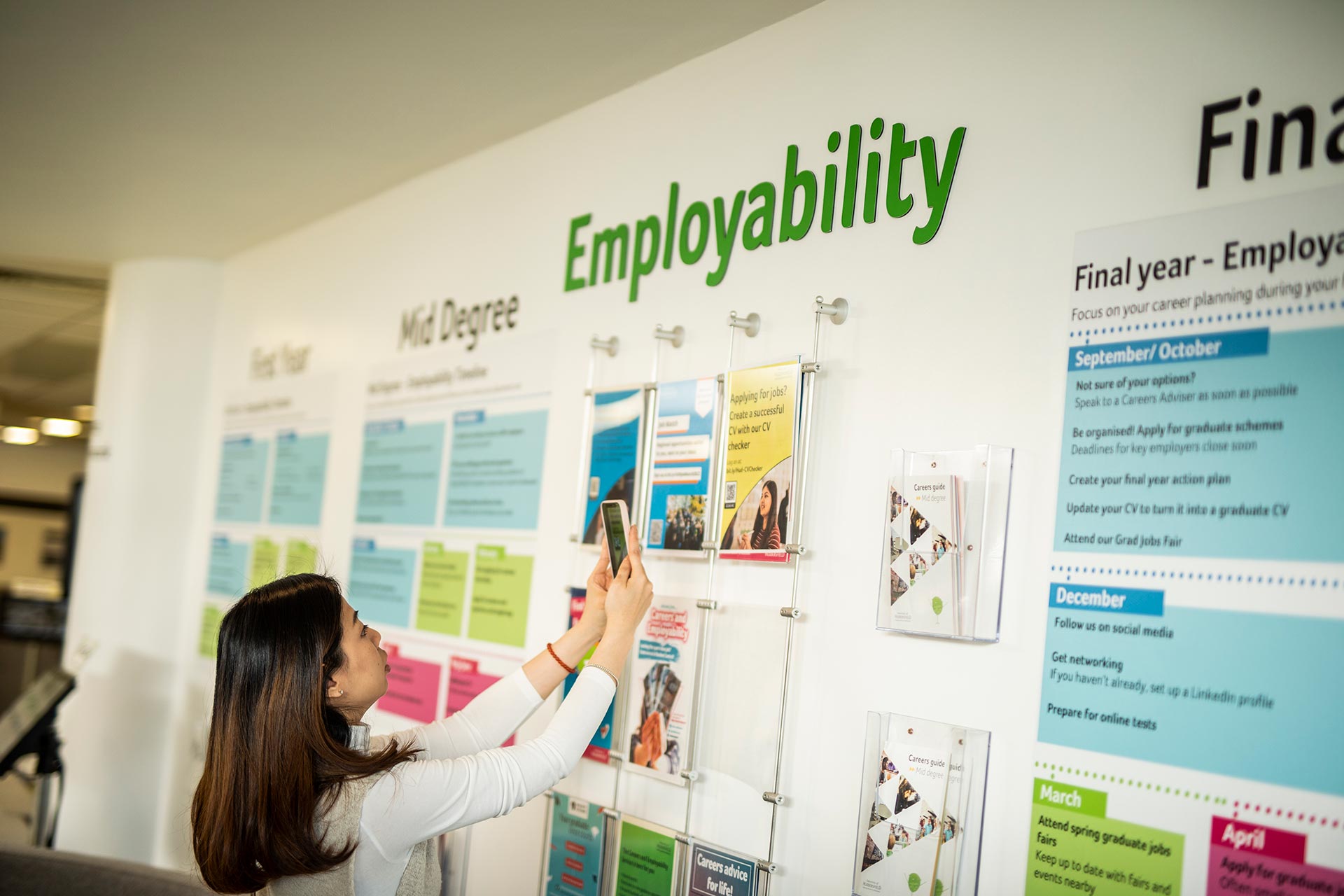
A Career in Careers: How to become a Career Development professional
Currently, there is a shortage of qualified Career Development professionals within the UK with many organisations struggling to recruit qualified practitioners; meaning now is an opportune time to consider training to become a Career Development professional.
In this second of our A Career in Careers blogs, we will explore the entry routes to working in Career Development, by looking at:
- Job roles in Career Development
- Progression routes
- Ways to gain experience and boost your skills
- The skills and qualities you need to work in Career Development
- Studying Career Development and Employability at Huddersfield
Job roles in Career Development
As mentioned in our first blog, the role of the Career Development professional is incredibly varied. You can find employment in education settings, where you will support students in planning their next steps. You can also find employment in prisons, charitable organisations, large corporate organisations, or as a self-employed freelancer.
Alongside providing individuals with one-to-one support in managing their careers, other roles in Career Development include:
• Employer Engagement Practitioner: Working in education settings, liaising with employers to provide opportunities for students to learn more about prospects within organisations and available opportunities.
• Careers Consultants: They are commonly found in corporate environments or within Higher Education. They take a strategic role in helping organisations develop strategies to support their workers or students to progress their careers.
• Labour Market Analyst: These roles focus on researching and analysing data to provide useful insights. This could involve analysing labour market information to understand trends in different employment sectors, increasing or decreasing opportunities, or salary changes.

Progression routes into Career Development
As a graduate, there are two main pathways to qualifying as a Career Development professional.
1. Undertake a specialist postgraduate (level 7) qualification in Career Development and Employability.
2. On the job, vocational training.
Level 7 qualification (Postgraduate Diploma or Masters)
A degree in any subject and a genuine interest in the sector is generally all that is required to enrol on a postgraduate Careers course. It often doesn't matter if you don’t have any experience in working in the Careers sector, as many courses provide opportunities to gain experience through placements. If you haven’t got a degree but have extensive relevant experience, you may still be accepted onto a course.
Some courses incorporate the Career Development Institute’s Qualification in Career Development (QCD), which provides additional recognition that your skills and knowledge are at a high level of professional competence. A postgraduate diploma plus QCD is the minimum qualification to work in Scottish schools. This postgraduate level of qualification is also often preferred for roles in Higher Education and for more senior roles.

Vocational training route/Apprenticeship
This is a work-based learning route, which involves working full time and undertaking some study on a part-time basis. Whilst you don’t necessarily need a degree to complete training at this level, you will need to be employed in a careers related role.
Some employers offer opportunities to undertake an apprenticeship, usually meaning one day per week is spent on your training. This is the minimum qualification required to work within a school or college in England or Wales.

Ways to gain experience and boost your skills
If you are looking to move into careers from another profession or field, these are some of the ways you can go about building your experience and preparing for the transition.
• Work experience: This should be something that enables you to develop your interpersonal and communication skills, particularly your listening skills. Ideally you will be able to demonstrate an interest in supporting people, for example roles within student societies or volunteer work with uniformed organisations, such as Scouts or St John’s Ambulance.
• Developing your professional network: Using platforms such as LinkedIn will enable you to make contacts and identify opportunities that may be available in the sector.
• Signing up for job alerts: This is a great way to stay aware of opportunities at different organisations, particularly with university careers services.
• Researching job providers: If you are interested in working in a school or college, it is useful to understand how the services are delivered in the local area and identify any careers companies who contract their service to schools.
Key Skills for Career Development professionals
Career Development professionals are dynamic and multi-skilled individuals. Here are some of the key skills required for the role, many of which you might already possess and can continue to develop.
• Active listening: Engaging with what your client says to effectively understand their needs, desires, and challenges to help them identify and achieve their career goals.
• Communication: Building trust with clients, explaining complex concepts, and providing feedback in a clear and concise manner.
• Empathy: Effectively understanding your clients’ feelings and being able to provide non-judgemental support and guidance.
• Flexibility: Switching between working with individuals, working with groups and tasks related to planning and developing the service.
• Organisation: Managing your time and responsibilities effectively, including managing client information, scheduling appointments and maintaining accurate records.
What qualities do you need to work in Career Development?
In addition to skills, here are three key qualities that will help you to thrive in role.
• Drive: Commitment to continuous learning and professional development, staying up to date on industry trends, new technologies and emerging career paths.
• Passion: You will need to have a genuine interest in the job market, to identify industry trends, in-demand skills and emerging fields.
• Innovation and creativity: Ability to identify different ways to support clients in exploring career options and increasing their self-awareness and understanding of their motivations. Innovative thinking is particularly useful to increasing the impact of service within the constraints of a small budget or limited resources.

Career Development and Employability at the University of Huddersfield
The University of Huddersfield offers a suite of postgraduate Career Development courses that are open to applicants from all degree backgrounds, as well as those currently working in Careers and looking to upskill.
Taught by research active academics with experience of working in the sector, our courses provide an in-depth look at the latest policies, practices and research within the sector. There are also opportunities to gain practical experience through placements and events.
You can choose between studying a full Master’s or postgraduate diploma, full or part-time study, and blended or 100% online via distance learning, affording you the ultimate degree of flexibility.

Professional recognition – Career Development Institute
When you study postgraduate Career Development and Employability at Huddersfield, you have the opportunity to undertake the Qualification in Career Development, awarded by the Career Development Institute (CDI). This is a nationally recognised qualification that will demonstrate to employers that your knowledge, skills and experience are up to date and aligned with the demands of the careers sector.
Final thoughts
Hopefully this blog has given you an insight into the pathways to becoming a Career Development professional and whether this is something you might want to pursue. If you haven’t already, you can read the first blog in our A Career in Careers series, which provides an overview of the role of a Career Development professional.

